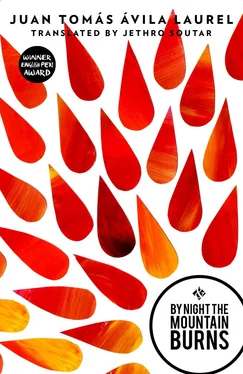Juan Ávila Laurel - By Night the Mountain Burns
Здесь есть возможность читать онлайн «Juan Ávila Laurel - By Night the Mountain Burns» весь текст электронной книги совершенно бесплатно (целиком полную версию без сокращений). В некоторых случаях можно слушать аудио, скачать через торрент в формате fb2 и присутствует краткое содержание. Год выпуска: 2014, Издательство: And Other Stories Publishing, Жанр: Современная проза, на английском языке. Описание произведения, (предисловие) а так же отзывы посетителей доступны на портале библиотеки ЛибКат.
- Название:By Night the Mountain Burns
- Автор:
- Издательство:And Other Stories Publishing
- Жанр:
- Год:2014
- ISBN:нет данных
- Рейтинг книги:5 / 5. Голосов: 1
-
Избранное:Добавить в избранное
- Отзывы:
-
Ваша оценка:
- 100
- 1
- 2
- 3
- 4
- 5
By Night the Mountain Burns: краткое содержание, описание и аннотация
Предлагаем к чтению аннотацию, описание, краткое содержание или предисловие (зависит от того, что написал сам автор книги «By Night the Mountain Burns»). Если вы не нашли необходимую информацию о книге — напишите в комментариях, мы постараемся отыскать её.
By Night the Mountain Burns — читать онлайн бесплатно полную книгу (весь текст) целиком
Ниже представлен текст книги, разбитый по страницам. Система сохранения места последней прочитанной страницы, позволяет с удобством читать онлайн бесплатно книгу «By Night the Mountain Burns», без необходимости каждый раз заново искать на чём Вы остановились. Поставьте закладку, и сможете в любой момент перейти на страницу, на которой закончили чтение.
Интервал:
Закладка:
The man got to where she was, found the woman whimpering and realised what had happened. He could make out the shape of the child lying a few feet away from the hole, although it wasn’t crying, it remained silent. The canoeman climbed into the hole and pulled the woman out. It wasn’t easy, for the hole was deep. It had been dug by several children at once. He sat the woman down on the sand and turned his attention to the baby boy, who the man understood was sick. And because the boy was sick and still only very little, he’d not moved from where he’d fallen after coming loose from his mother’s arms. Darkness reigned over the island. There was no light on the beach and they could see only what was close enough for them to make out. The man picked up the shape he assumed was the child and handed it to the woman, who was still whimpering because of her sore ankle. Did the man not notice that the child hadn’t whimpered at all, that it hadn’t cried once during the whole journey? He probably did notice, but the way things had happened there wasn’t much time to think, and the woman was still in need of assistance.
Having established what had happened, he now needed to go for help. The woman had a sick child, but she could no longer walk. If she’d been on her own, without the sick child, the canoeman would have carried her home on his back, but he couldn’t carry her if she had to carry a child, for she wouldn’t have been able to hold on to his shoulders. So he needed to get help. There was no other option. In other circumstances, he would not have left a woman on her own on the beach with a sick child in the middle of the night. In other circumstances, the woman would not have let him leave her on her own in the dark at the water’s edge holding on to a dead child, for that’s what her boy was. Any unknown being might emerge from the sea, and she was a woman, and it was night. There wasn’t another soul on the beach, for no one was expecting anyone to arrive from one of the settlements. But they had arrived, and in painful circumstances. They had no choice. The canoeman would knock at the door of the first house he found open, or else at the closed door of the house of an acquaintance, and ask for help. Given the situation, the man probably didn’t know where the woman with the sick child lived, so he could not go to her house to seek help there. And in any case, the woman had only one sister, and if the sister were away in another village, that house would be empty and shut. There’d be no sign of life in it and not just because of the dark.
The big village wasn’t totally empty and the man found some people and explained what had happened: he had brought a woman from the south village with her sick child; they’d had a problem advancing in the canoe, but they’d got there in the end; the woman had climbed out of the canoe, taken her child and set off for home, but a few feet away from the water’s edge she’d fallen down a hole, and now she couldn’t walk. He said he needed help to get her off the dark shore, and that they needed to act right away. She’d be very frightened on her own at the water’s edge. As I’ve said before, everyone on the island knew each other, although not everyone knew the particular circumstances of everyone else. The people he told the story to showed their concern and a few minutes later they were all down on the beach, at the exact spot where the man had left the mother and her sick child, near the hole into which she’d fallen and hurt her ankle. They went with a lantern, and with people pitying that poor woman’s plight, but she wasn’t where the man had left her. She couldn’t walk, so how could she have moved? Did the woman have strange powers after all? The hole was there, but there was no sign of the woman. The lantern they had didn’t produce much light, and it made them nervous being on the beach at that time of night. Although if the lantern had made a lot of light, they’d have been nervous too, for they’d have been combating the darkness but exposing themselves to who knows what — for it was the middle of the night. Where had the woman gone? The man had assured the people who’d come to help that she couldn’t walk, and surely he would not have lied to make them leave home in the middle of the night. They looked at one another, they looked around, but they didn’t dare call out. Had yet another misfortune befallen her? Just as they started to doubt what they were doing there, they heard a whimper from a few feet away. A whimper like someone blowing their nose. A little fearful of what it might be, they approached with the lantern, the canoeman in front, and, in among the beached canoes, he found the woman. She lay sprawled out in the sand, her child held to her chest, though because of the way she was turned, the boy was also laid out in the sand. What had happened was that she’d felt very exposed out there in the middle of the beach, so she’d managed to drag herself, or crawl, with her child under one arm, to the beached canoes, where she’d squeezed in between two of them. The canoes were beached very close together with just enough room for a man to walk between them, so as not to take up too much space. She felt safer there. Lying in the dark, she’d thought about how all she had in life was one sister, that they’d had a hard life and that, although it had gone on being hard with a child she’d got after going to talk to the white men on the boat, she now felt devastated, for in a few hours’ time her child would be buried in the ground, because some sickness, or hardship itself even, had taken the child’s life away. That’s why she held the child to her breast, as if her son were still alive, and she cried for all that her life had been, culminating with breaking an ankle on the beach in the dark in the middle of the night. She cried in silence but you could still hear her sniffling, the sound of her nose. She lay sprawled out in the sand, something an adult rarely did. Sprawled out in the darkness, at the water’s edge, on an island in the middle of the Atlantic Ocean.
I’m not a writer, or a teacher, or a priest. I don’t know anyone on the island who could be described as a writer. It’s an occupation, or a state, that none of us knew anything about. We’d never heard of it before. The only people who ever knew how to write on the island were the teacher, the priest and the functionaries who worked in the governor’s office, though we never knew what they came to do. What I have spoken of is what I experienced, heard and saw when I was a child. It has never been put down in writing before, because, as I said, I am not a writer; nobody on the island is. If this story becomes known, it will be because of some white people. They came to our island and wanted to know our folk tales, the stories we tell at night before going to sleep. Or that we used to tell, or that we remember being told by others as we gathered round, ears at the ready. They asked me to tell them a folk tale, or several, and I thought the best thing to do was to tell them the story of my childhood, for I couldn’t remember any folk tales from back then. The white people said they had come to recover our oral storytelling tradition, and their leader, a man named Manuel, said I could tell him whatever story I liked, because childhood memories would likely hold some significance too. I told him what I remembered of those years, and I closed my mouth when I considered the story finished. It took us two days; that’s to say, we met twice, on two different days. I hope the contraption he used to capture my words captured them properly … If I’d been good at writing myself, I wouldn’t have required someone else to put down in writing what I myself experienced. But after learning to count up to five hundred and something, after learning to add, subtract, multiply and divide numbers with two figures, and after learning that Spanish words are divided into aguda, llana and esdrújula , I couldn’t take my studies any further. For many reasons. So the white people’s interest is my opportunity. I hope Manuel manages to find a way to get my story written down, so that anyone who experienced it, anyone from our island who was the same age as me when I experienced these things, is able to recall what happened in their lives. I know you can’t cover everything in a story told over just a few hours. But I thank Manuel for allowing my story, which is also the story of many people on the island, to take the place of the folk tales he wanted for his work.
Читать дальшеИнтервал:
Закладка:
Похожие книги на «By Night the Mountain Burns»
Представляем Вашему вниманию похожие книги на «By Night the Mountain Burns» списком для выбора. Мы отобрали схожую по названию и смыслу литературу в надежде предоставить читателям больше вариантов отыскать новые, интересные, ещё непрочитанные произведения.
Обсуждение, отзывы о книге «By Night the Mountain Burns» и просто собственные мнения читателей. Оставьте ваши комментарии, напишите, что Вы думаете о произведении, его смысле или главных героях. Укажите что конкретно понравилось, а что нет, и почему Вы так считаете.












